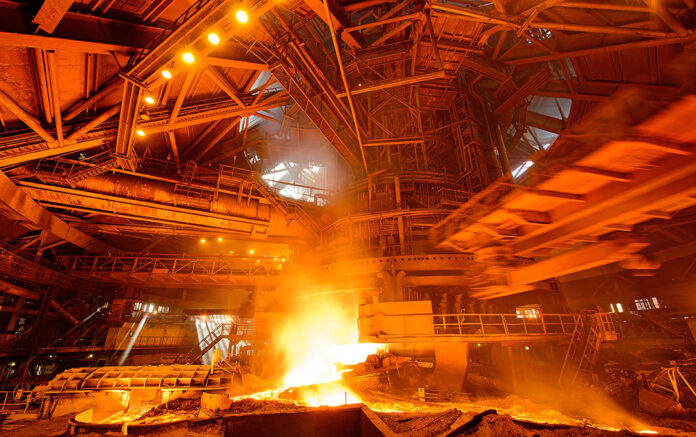ISLAMABAD: As the National Tariff Commission (NTC) has proposed a reduction in tariff on import of finished or semi-finished steel products, the local steel industry has voiced its serious concerns about the move, saying that it would ultimately result in de-industrialization in the country.
In a letter sent to Ministry of Commerce, Pakistan Association of Large Steel Producers (PALSP) has informed the ministry that any reduction in tariffs on imported finished or semi-finished steel products under the garb of “Tariff Rationalization” will result in de-industrialization and closure of steel industry as well as massive unemployment in the country.
As the ministry is working on ‘tariff rationalization’ through consultation with different stakeholders, the NTC has proposed reduction in tariff on imports of the finished steel products, removing the protection given to domestic industry.
“First of all, the government must realize that reducing tariffs on domestically manufactured items without providing a globally competitive business environment will surely lead to de-industrialization. Pakistan ranks dismally low (#110) on the Global Competitiveness Index published by the World Economic Forum and this shows that our business environment is not competitive with other countries. All major steel exporting countries feature much higher than Pakistan in the competitiveness index,” the association said in the letter.
According to PALSP, the local industry does not agree with the proposal submitted by the NTC earlier this year to the Tariff Policy Board for the long steel sector.
“It is baffling that the NTC had submitted a tariff proposal to virtually de-industrialize the steel sector. There is no evidence of any export bias in the local steel industry as there is cut-throat competition and current margins are close to zero. Resultantly, there is no evidence of abnormal profits either. In fact, the domestic steel industry has been successful in bringing new capacity and technology to meet the quality and quantity requirements of the economy. The domestic steel industry creates import substitution in excess of $ 1.2 billion per year.”
The proposal comes at a time when other countries are increasing protection and moving away from reducing tariffs on finished & semi-finished steel products, particularly in the steel industry. This is due to a global oversupply in the steel industry where anti-dumping and anti-subsidy/countervailing investigations have been a commonplace over the past five years.
PALSP opined that reducing tariffs at this point in time will only open the flood-gates for millions of tonnes of steel to be dumped into Pakistan that is lying surplus in other countries. The domestic steel industry has invested billions in recent years to bring in new capacity and world-class technology to improve efficiencies and competitiveness. However, the government needs to do its part to make substantial progress on the much-delayed and much-needed structural reforms to reduce the cost of doing business, enable fair competition, fix tariff anomalies, and facilitate core industry issues before considering tariff rationalization.
The steel industry has been going through a tough time over the past couple years. Foreseeing mega-projects under China Pakistan Economic Corridor (CPEC) and the Prime Minister’s Naya Housing Project, local business groups have made huge investments in the recent past in hope for a surge in demand – only to have been handed a stifled economy under a strict International Monetary Fund (IMF) program that saw massive increases in costs due to unprecedented currency devaluation, uptick in interest rates (now revised), increase in energy costs, increase in taxation (GST) and a nosedive in demand.
“While the government has provided some incentives to real estate developers, we have not seen much of a rise in demand as yet. Projects are being registered under the construction package but there isn’t much activity on-ground. We are mostly servicing projects that were already on-going before the Covid-19 lockdown and it is yet to see whether projects in the pipeline will materialize. There may be a gradual recovery in the second half of the fiscal year but this will remain a tough year for steel manufacturers with oversupply in the local market and much pressure on margins,” PALSP officials said.
The association has urged the ministry to link tariff reductions to milestones related to structural reforms that will help provide a more competitive business environment. This way, the government will be able to safeguard the huge import substitution and the industry-related jobs while addressing tariffs in a logical manner.
The milestones relate to reducing the cost of doing business, enabling fair competition, fixing tariff anomalies, and facilitating core industry issues.
“We have studied steel industries in many different countries to understand what specific factors give them an edge. For example, China, India, Iran and Ukraine all have state-owned companies that mine and provide iron ore to the private sector for steel making. Pakistan has large reserves of iron ore but remains unexplored due to issues related to litigation, law and order and capital requirements.”
Moreover, Pakistan has one of the lowest per capita consumptions of steel of only 37kg versus a global average of 256kg. Such a small market prevents local companies from achieving the scale required to compete globally.
Additionally, the industry remains fragmented and wealth creation is stifled due to various tariff anomalies and lack of enforcement issues that the government has failed to address.
“The milestones that we have recommended to the government aims to address general issues related to building a competitive business environment as well as these industry-specific issues mentioned above,” PALSP mentioned.




